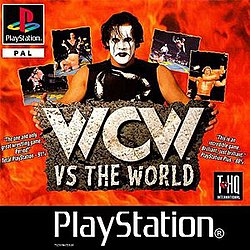Virtual Pro-Wrestling
| WCW vs. the World | |
|---|---|

European Playstation cover art
|
|
| Developer(s) |
Asmik Ace Entertainment The Man Breeze |
| Publisher(s) | |
| Platform(s) | PlayStation |
| Release | PlayStation |
| Genre(s) | Wrestling |
| Mode(s) |
Single-player Multiplayer (up to two players) |
WCW vs. the World (known in Japan as Virtual Pro-Wrestling) is a professional wrestling video game for the PlayStation video game console. It was released in 1996 in Japan and 1997 elsewhere. It was the first game developed by The Man Breeze (who later became the AKI Corporation) to be released outside Japan and the second wrestling game for the PlayStation, following Power Move Pro Wrestling. WCW vs. the World marks the first title in the Japanese Virtual Pro Wrestling series and would be the first World Championship Wrestling video game released during its rise amidst the Monday Night Wars.
WCW vs. the World features various modes including League Challenge, Best of Seven, Exhibition, Elimination, Tournament, League, and Double Title. Such modes are predominantly characteristic of Japanese pro wrestling as opposed to American customs.
The game includes many other establishing features that would carry on and improve in future AKI wrestling games. A "spirit meter" replaces the traditional but more linear energy bar to better suit the momentum of a wrestling match. However, it also features modes surrounding the winning, defense, and even creation of championship belts which would be entirely absent from the game's immediate successor, WCW vs. nWo: World Tour. The latter, however, would achieve far greater popularity thanks to its introduction of the intuitive "grappling system" not yet developed in WCW vs. the World.
The game features 51 wrestlers. In addition to its WCW/nWo roster, in keeping with the game's title, WCW vs. the World also has several "fictional" foreign wrestlers. These performers are actually renamed counterparts of real-life Japanese wrestlers that could not be properly represented in the game's American version due to copyright restrictions. This practice of altering Japanese performers for American games would carry on through two more AKI games for the Nintendo 64.
...
Wikipedia
